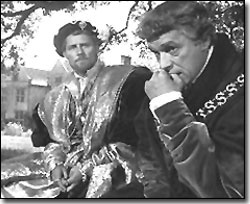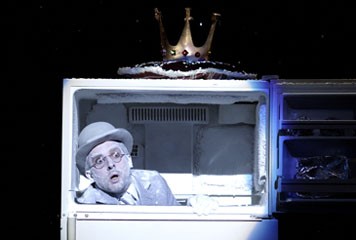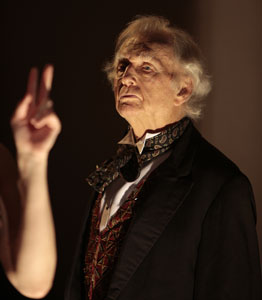“If tragedy elicits our compassion, comedy appeals to our self-interest. The former confronts life’s failures with noble fortitude, the latter seeks to circumvent them with shrewd nonchalance. The one leaves us momentarily in a mood of resignation, the other in a condition of euphoria.”
Harry Levin, Playboys and Killjoys
Archives for March 2008
CAAF: Afternoon coffee
• This profile of Bret Easton Ellis is about a hundred times more interesting than you’d think. Or, than I thought it’d be. Ellis’ novels aren’t favorites but I think they’re smarter thought experiments than they get credited for (if sometimes wildly uneven in the follow through). For cultural juxtaposition, I suggest reading the profile while viewing this terrifying footage of Demi Moore talking about her “leech therapy.”
(First link via TEV.)
• Three books I’m desperate to read, with links to the why’s and wherefore’s so you can be desperate to read them too: Jiang Rong’s Wolf Totem, Roger Deakin’s Wildwood, and Richard Fortey’s Dry Store Room No. 1: The Secret Life of the Natural History Museum. I’m also already hearing great things about Jincy Willett’s new novel, The Writing Class, which comes out in June.
• From the vaults: Marianne Moore’s zealous editing wasn’t confined to her friends’ poems, she was just as active at hacking away at her own. In a 2003 essay for The Believer, Dan Chiasson writes:
“Omissions are not accidents,” was the adage, self-minted, that served as the epigraph to Moore’s 1967 Complete Poems. That book was anything but “complete,” except in the sense of “finished off.” It seemed more a tally of subtractions than additions; Moore had radically revised some poems, and radically erased others. The resulting dainty book misrepresented her, and Moore has seemed, though never less interesting, somehow less ambitious than her male counterparts, Stevens, Eliot, and Williams.
Grace Schulman’s new collected Moore, The Poems of Marianne Moore (November 2003), prints every significant poem Moore wrote, including many she later suppressed and several she never printed at all. It is not a desecration of Moore to do so; as Schulman points out, “change” was at the heart of her aesthetic, and had she lived another thirty years she most surely would have found her own Complete Poems inadequate.
TT: Under fire
This is my week: three deadlines, five shows, and a trip to Washington, D.C. tomorrow morning.
Later. Maybe.
TT: Almanac
“Unless comedy touches me as well as amuses me, it leaves me with a sense of having wasted my evening. I go to the theatre to be moved to laughter, not to be tickled or bustled into it.”
George Bernard Shaw, “An Old New Play and a New Old One”
TT: Entries from an unkept diary
 • I never saw Paul Scofield on stage. Few Americans did: he performed in this country only once, in the 1961 Broadway production of Robert Bolt’s A Man for All Seasons. So his death last week failed to make much of an impression on me. On the other hand, I never saw John Gielgud, either, yet I felt a real sense of loss when he died. What accounts for the difference?
• I never saw Paul Scofield on stage. Few Americans did: he performed in this country only once, in the 1961 Broadway production of Robert Bolt’s A Man for All Seasons. So his death last week failed to make much of an impression on me. On the other hand, I never saw John Gielgud, either, yet I felt a real sense of loss when he died. What accounts for the difference?
The answer, of course, is that Gielgud appeared in dozens of feature films, usually playing small but strikingly written parts that allowed him to make a memorable impression. Not so Scofield. He made very few movies, and only two of them, Robert Redford’s Quiz Show and the 1966 screen version of A Man for All Seasons, are reasonably well known to American audiences.
Time was when I might have used that fact to preach a sermonette about the cultural primacy of film over theater, a point I made in “Tolstoy’s Contraption,” an essay I published in The Wall Street Journal in 1999 and reprinted in A Terry Teachout Reader:
We are not accustomed to thinking of art forms as technologies, but that is what they are–which means they can be rendered moribund by new technological developments, in the way that silent films gave way to talkies and radio to TV. Well into the eighteenth century, for example, most of the West’s great storytellers wrote plays, not novels. But the development of modern printing techniques made it feasible for books to be sold at lower prices, allowing storytellers to reach large numbers of readers individually; they then turned to writing novels, and by the twentieth century the theatrical play had come to be widely regarded as a cultural backwater. To be sure, important plays continue to be written and produced, but few watch them (unless they are made into movies).
 I still stand by that paragraph. Having spent the past five years as a working drama critic, though, I hasten to point out that I never meant to suggest that live theater is less aesthetically important than film simply because fewer people see it. Nevertheless, it strikes me as both revealing and ironic that most Americans under the age of sixty–myself, alas, included–will remember Paul Scofield not as one of the greatest stage actors of the twentieth century but as the man who played Charles Van Doren’s father in Quiz Show.
I still stand by that paragraph. Having spent the past five years as a working drama critic, though, I hasten to point out that I never meant to suggest that live theater is less aesthetically important than film simply because fewer people see it. Nevertheless, it strikes me as both revealing and ironic that most Americans under the age of sixty–myself, alas, included–will remember Paul Scofield not as one of the greatest stage actors of the twentieth century but as the man who played Charles Van Doren’s father in Quiz Show.
• Ask Me Again, a two-CD set of previously unreleased recordings by the late Nancy LaMott, turned up on the Billboard jazz charts last week, ascending to the #15 spot, a few notches below Tony Bennett, Michael Bublé, Diana Krall, Wynton Marsalis, Pink Martini, and Queen Latifah. That is, to put it mildly, a decidedly miscellaneous group of artists, one whose makeup says much about the no less decidedly marginal place of jazz in postmodern America.
Needless to say, Nancy herself would have smiled to see herself described as a jazz singer: she was nothing of the kind, though she loved jazz and was comfortable working with those who played it. Even so, it pleased me greatly to see my old friend sharing a page in Billboard with Diana Krall. They never met, and an untimely death robbed Nancy of the chance to ride the same wave of changing taste that swept Diana to the well-deserved fame she now enjoys. If only…
 • Onstage humor is a delicate plant, capable of wilting without warning. I saw Mark Morris’ staging of Purcell’s King Arthur at New York City Opera a couple of weeks ago and laughed all the way through it, but it took the rest of the audience an hour or so to catch up with me. A minute or so into the evening, a woman sitting in front of me turned around and glared when I snickered at one of Morris’ more obvious visual punch lines. If a thought balloon had formed over my head at that moment, it would have read as follows: Hey, lady, didn’t you get the memo? This is supposed to be funny!
• Onstage humor is a delicate plant, capable of wilting without warning. I saw Mark Morris’ staging of Purcell’s King Arthur at New York City Opera a couple of weeks ago and laughed all the way through it, but it took the rest of the audience an hour or so to catch up with me. A minute or so into the evening, a woman sitting in front of me turned around and glared when I snickered at one of Morris’ more obvious visual punch lines. If a thought balloon had formed over my head at that moment, it would have read as follows: Hey, lady, didn’t you get the memo? This is supposed to be funny!
Then it hit me: I was surrounded by operagoers, not dancegoers. Opera buffs aren’t in the habit of laughing in the theater, not even at comic operas. Dance buffs, by contrast, are well aware of Morris’ reputation as a comedian, so much so that they sometimes laugh at scenes whose beauty makes me want to cry.
As for me, I regard comedy as the highest form of art. “Human existence,” I once wrote apropos of the music of Emmanuel Chabrier, “is so indissoluble a mixture of heartbreak and absurdity that it can often be more acutely portrayed through the refracting lens of comedy.” Alas, the world is full of earnest, humorless souls, and my impression is that they usually make a better living than those of us who find life funny–though I doubt they have nearly as good a time as we do.
TT: Almanac
“The cause of laughter is simply the sudden perception of the incongruity between a concept and the real object.”
Arthur Schopenhauer, The World as Will and Idea
TT: Paul Scofield, R.I.P.
TT: Introducing…The Amazing Prospero!
Today’s Wall Street Journal drama column consists of a rave and a pan, in that order. First I report on a production of The Tempest that I saw last Sunday in Cambridge, Massachusetts, followed by a review of the American premiere of Caryl Churchill’s Drunk Enough to Say I Love You? Here’s a sample.
* * *
All theater is magic. Even the most naturalistic of productions seek to deceive us into supposing that the stage we see is really someplace else: a cluttered living room, a sterile doctor’s office, a grimy inner-city diner. But few things can be so spellbinding as a play whose director shrugs off literalism and chooses instead to wave the wand of imagination. That’s what happens in the production of “The Tempest” currently being presented by Boston’s Actors’ Shakespeare Project, in which Patrick Swanson takes Shakespeare’s tale of a ship run ashore on an enchanted isle and turns it into a 19th-century magic show. I’ve reviewed many memorable Shakespeare productions in this space, but Mr. Swanson’s “Tempest,” like the “King Lear” that he mounted for Actors’ Shakespeare two seasons ago, ranks very near the top of my list….
 Prospero (Alvin Epstein) is decked out in a velvet-lined cape, Ariel (Marianna Bassham) dons the top hat and black tights of a conjuror’s assistant, and the play itself becomes a music-hall turn acted on a tiny thrust stage ringed with footlights that look as though they’d been made by Tom Edison himself. The “theater” is an 1889 Cambridge courtroom that has been converted into a performing space. All of Actors’ Shakespeare’s productions are site-specific, and David R. Gammons, the designer, makes the most of this one, using the second-story gallery as an alternate playing area whose staircase allows for grand entrances and exits. Eric McDonald performs his incidental music in full view of the audience, rattling a thunder sheet and tootling on a slide whistle with the flair of an old-time radio sound-effects man.
Prospero (Alvin Epstein) is decked out in a velvet-lined cape, Ariel (Marianna Bassham) dons the top hat and black tights of a conjuror’s assistant, and the play itself becomes a music-hall turn acted on a tiny thrust stage ringed with footlights that look as though they’d been made by Tom Edison himself. The “theater” is an 1889 Cambridge courtroom that has been converted into a performing space. All of Actors’ Shakespeare’s productions are site-specific, and David R. Gammons, the designer, makes the most of this one, using the second-story gallery as an alternate playing area whose staircase allows for grand entrances and exits. Eric McDonald performs his incidental music in full view of the audience, rattling a thunder sheet and tootling on a slide whistle with the flair of an old-time radio sound-effects man.
Mr. Epstein, who turns 83 in May, played Lear to awesomely eloquent effect for Actors’ Shakespeare in 2005. Now he speaks the lines of Prospero, Shakespeare’s other old-age star turn, with a fullness of understanding to which no actor can aspire until he reaches the time of life when (as Prospero puts it) “every third thought shall be my grave.”…
I’ve never seen a worse play by a better author than Caryl Churchill’s “Drunk Enough to Say I Love You?” That Ms. Churchill should make so embarrassing an impression in a mere 45 minutes is further proof that politics can make artists stupid, for this pathetic little playlet is nothing more than a political cartoon, one whose draftsmanship is as crude as its underlying premise.
The lights go up on Sam (Scott Cohen), a handsome homosexual who has seduced Guy (Samuel West), a married man with children, and persuaded him to abandon his family and job. Within a half-minute or so, we figure out that Guy is England, Sam is the U.S. (duh, get it?) and the abandoned wife and kids are the European community. The rest of “Drunk Enough to Say I Love You?” consists of a lovers’ quarrel conducted in unpunctuated sentence fragments: “so much fun in my life…being powerful and being on the side of good is…God must have so much fun…win win win.” Needless to say, the point of these coy exchanges is that the American government bears sole responsibility for all the evil in the modern world…
* * *
Read the whole thing here.
